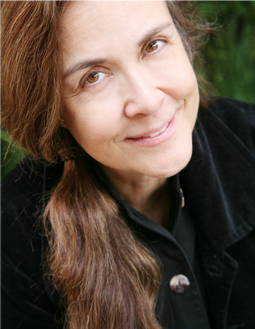They just don’t know our stories,
(after being tear gassed by Israeli soldiers,
she held the cut onion, the hankie to her face) –
If they knew our stories, they would behave a different way.
They never sat around my small fire cracking almonds.
They don’t know I have a great sense of humor.
I never showed them what I keep inside my green trunk,
the tiny treasures I have left, since they took my house…
… if they saw them they might laugh,
the broken plate, the strip of cloth.
It might be good for them to laugh,
since they never smiled at us yet,
not even once. I don’t know where they came from
but I come from here, it was always my field,
I don’t care who owns it, it’s mine.
If you speak to the trees, they’ll speak back
not only with olives but a soft mixing of leaves
after the soldiers return to the city, or wherever else they go,
and the trees with their deep hearts apologize for all meanness,
I mean this, a rustling…
They just do not know.
Netanyahu
You don’t need a periscope
or a microscope
to see another human being
guiding a child
hand on shoulder of a child
arranging a coverlet over a sleeping child —
You don’t need a stethoscope
to imagine a heartbeat.
What does it mean when one person thinks
others deserve nothing?
What is that called?
If you know what it is called why keep
doing it?
You don’t need a skewer for broiling
or a paring knife for seeing inside.
Notes:
My Palestinian father, Aziz Shihab, was a newspaper journalist most of his life. Though generally a congenial, gracious spirit, he was highly annoyed by headlines that didn’t actually fit their stories—a more common predicament for print journalists than many might believe. He resented poor grammar—in English or Arabic—and was exquisitely careful with his own. And he was saddened by displays of inequity and small-mindedness—in society, religion, politics—and the ongoing false spins about the “great democracy of Israel,” when his own family had lost their home in Jerusalem in 1948 due to the occupying Zionist soldiers. It was all a sell-out: money, guilt, power. Why couldn’t a balanced country have been created instead, one which recognized that Palestinians were already conducting themselves and their precious lives on the same soil (do not for a minute, please, believe the empty desert-before-their-coming myth which Zionism has repeatedly tried to perpetuate)? It was a lifelong grief for him and he did everything he could—speaking, writing, advocating—to try to balance the “dark matter” of lies.
Why couldn’t we more easily imagine one another’s lives? Why was empathy so difficult? Former President of Israel Shimon Peres once said what surprised him most about getting to know Palestinians was, “that they had aspirations like ours.” Well, why wouldn’t they? Do I in my Texas home two hours north of Mexico imagine mothers across the border don’t love their sons as much I love mine? Since when did human imagination become so parched and puny?
Many regular citizens of Israel are able to appreciate Palestinians as human beings with traditions, skills, incredible patience and intelligence—and vice versa. Consider hospitals. Consider Hand in Hand Schools. Consider the fascinating and balanced-power Neve Shalom village, etc. Why can’t politicians with tons of cash behind them imagine a wider horizon of shared lives together, as regular citizens can, and do? Can anyone even imagine what a tremendous glowing society that might be? And how would this single shift change the sizzling, awful, underground energy of “terrorism”?
But the “chosen” theory would have to die. You can’t have “chosen” and “unchosen” dwelling in easy harmony. (How these ongoing, seemingly endless inequities of consideration might connect to recent Paris crimes, or the popularity of extremism, or attitudes of American exceptionalism which suggest we are free to do whatever we like within other people’s borders, is a long discussion for smarter people. I do recall a South African driver asking me, at the moment the United States was invading and bombing Baghdad, what would Americans think about us if we did that in Algeria?)
The current crop of Republican candidates, with their righteous spouting of devotion to Israel (never considering all the crimes against humanity Israel conducts on a daily basis, or the regular massacres of thousands of innocent Gazans, with American weapons, which gets almost zero press) would have disgusted my father. He would have turned his face away. I am almost glad he died so he didn’t have to hear them.
About the Author

Naomi Shihab Nye – Naomi Shihab Nye’s most recent books are The Turtle of Oman (Greenwillow), a novel for children, and Famous (Wings Press), a single poem illustrated by Lisa Desimini. She has written or edited thirty-five books and been a “visiting writer” all over the world for many years.
Return to top